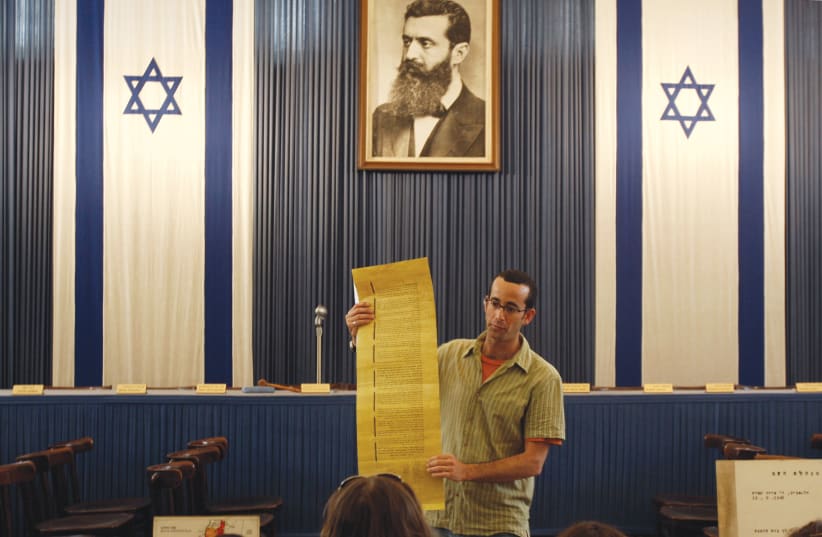Centuries later, Ahad Ha’am explained that while Theodor Herzl’s Zionism was an attempt to save the Jews, his Zionism aspired to save Judaism. Judaism, Ha’am insisted, was not a religion in which one believes, but a nation which nurtures solidarity. And nationalism could stimulate secular Jews to revitalize religious traditions.
These days, according to Micah Goodman (a senior fellow at the Shalom Hartman Institute in Jerusalem, founder of Beit Prat, and author of Catch-67: The Left, the Right, and the Legacy of the Six Day War), addressing the cultural political, and philosophical implications of these claims and conundrums is, if anything, even more complicated. Science, archaeology and biblical criticism have undermined Judaism’s foundational story. Post-modernism has reduced reason to subjective standards of faith. The most pressing dilemma for most of us is less about choosing between incompatible sources of authority and more about “a collision between the need to belong and the need to be free.”
In The Wondering Jew: Israel and the Search for Jewish Identity, Goodman examines how “Judaism, and in particular Israeli Judaism, confronts these profound universal challenges.” Learned, lucid, profound and provocative, Goodman’s book seeks to refute claims that religious tradition demands certainty while secularism generates skepticism.
Jews in Israel and Diaspora Jews, Goodman emphasizes, have distinctly different frames of reference about Jews and Judaism. Militantly secular, Zionists felt an aversion to the mechanistic formalism of Judaism and harbored contempt for many of their fellow European Jews. Their aim was to liberate Jews from the rule of non-Jews. Nathan Birnbaum, who coined the term “Zionism,” described Jews as an inferior people, lacking “personal courage, dignity, tact and an aesthetic sense.”
Nonetheless, Zionists insisted on establishing the State of Israel on ancient land and reviving the Hebrew language. When their dreams came true, Zionism’s “dual identity fractured into constituent parts.... An identity based on contradictions was replaced by a society full of divisions.” Claiming a monopoly on matters related to tradition, Orthodox Jews had the clout to erect cultural barriers and enact a static code of law that governed citizenship, marriage and Sabbath observance. Secularists increasingly felt threatened by any contact with tradition.
“Very many things in the inheritance of our forefathers kill our souls and give them no redemption,” said writer and journalist Micha Joseph Berdyczewski, who had been educated in a yeshiva and felt stifled by religious law.
IN ANALYZING Diaspora Jews, Goodman sticks close to conventional wisdom. The predictions of Orthodox Jews, he claims, were correct: The modern world’s lowering of barriers to assimilation “created a dangerous reality.” The rate of intermarriage of less observant and secular Jews in the United States has skyrocketed, while self-segregated, semi-autonomous Orthodox communities observing Jewish law have survived and grown. Outside Israel, Jews must choose between two bad options: change Judaism (by having morals trump rituals and traditions) in order to preserve it, or refuse to change any laws and practices and risk losing it. Goodman hopes Diaspora Jews will find a way to “guarantee Jewish continuity without relinquishing their openness and dynamism.”
That said, Goodman indicates that his book is about Israeli, not Diasporic Judaism. His thesis is that “only in Israel and thanks to Israel” (in which many threats to Jewish identity, including intermarriage, have disappeared) can practices be reformed without endangering Judaism. And that Jews can forge meaningful connections to their past without compromising their freedom or surrendering their secular identity.
Goodman’s project is grounded in his view that rabbinic sages of late antiquity had the authority to renew Halacha (Jewish law) to reflect changing times and events, and that the Torah was eternal because people renewed and reshaped it. He describes a number of “alternate” secularisms that are, for example, based on the belief that Judaism is not the word of God, but of the Jewish people; Maimonides’s assertion that God had moved farther and farther away from everyday experience and humanity cannot speak about Him; the assumption that people can follow Halacha not out of obedience but as a personal choice (and may reject laws that discriminate against women and homosexuals or regulate Sabbath observance).
Abstract and at times silent on the challenges of implementation and the impact of “alternate secularism” on the authority and distinctiveness of Judaism, The Wondering Jew is an eloquent and urgent call for Israelis to find a way to bridge the current divide between its warring camps.
“Between the path of doubt, which empties the world of meaning, and the path of fanaticism, which lays the world to waste,” he insists, is a “middle ground” that can accommodate religious Zionists, who are willing to embrace a way of life that offers fulfilling opportunities for religion, but no certainty; and secular Zionists, who seek to reconnect with tradition and religiosity but not necessarily with religion.
The writer is the Thomas and Dorothy Litwin Professor of American Studies at Cornell University.
THE WONDERING JEW: ISRAEL AND THE SEARCH FOR JEWISH IDENTITY
By Micah Goodman
Translated by Eylon Levy
Yale University Press
258 pages; $30
